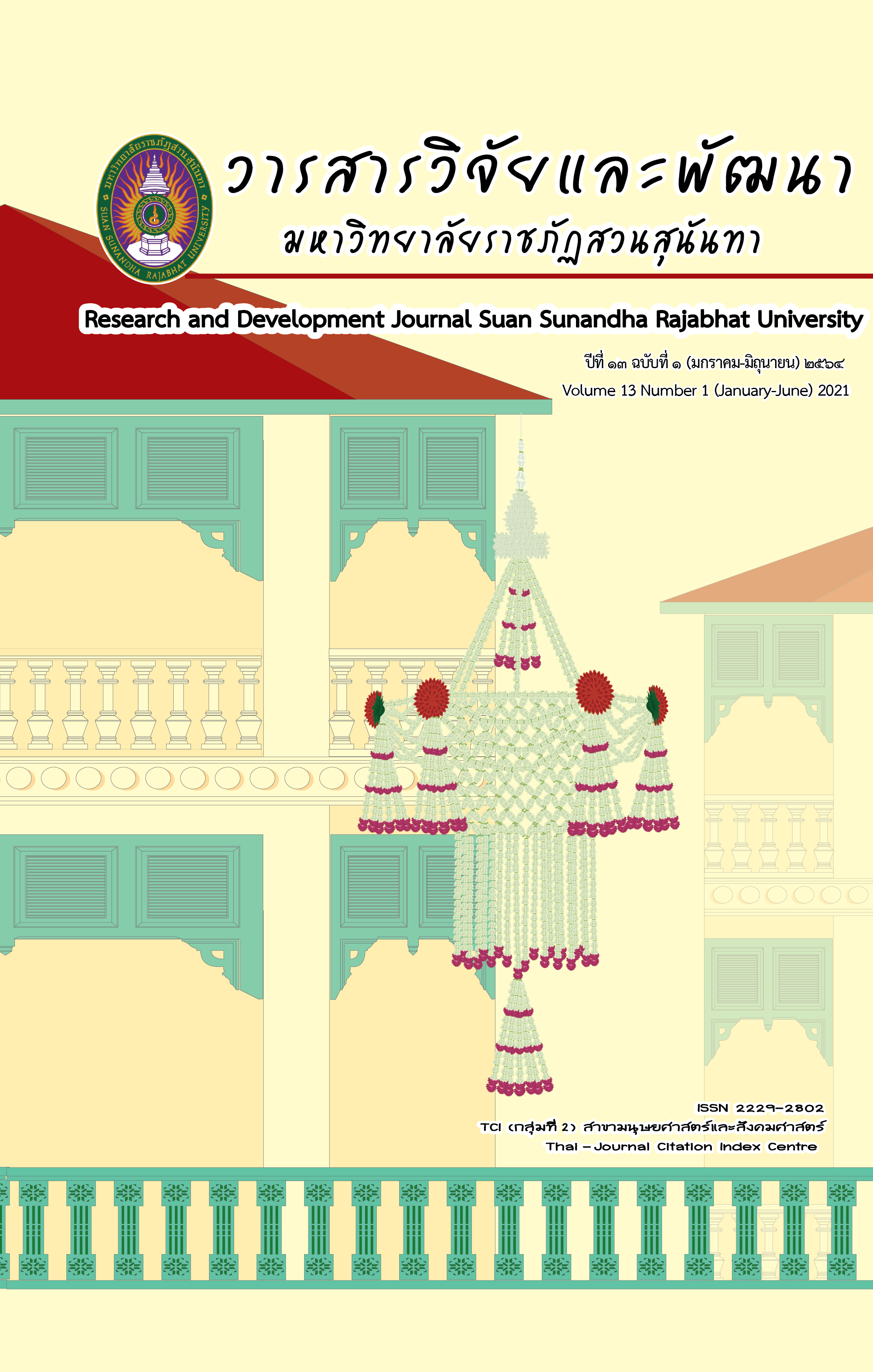องค์ประกอบสมรรถนะของผู้บริหารสถานศึกษาในยุคดิจิทัล สังกัดสำนักงานเขตพื้นที่การศึกษาประถมศึกษานนทบุรี เขต 1
คำสำคัญ:
องค์ประกอบสมรรถนะ, ผู้บริหารสถานศึกษา, ดิจิทัล, นนทบุรีบทคัดย่อ
การวิจัยเรื่อง องค์ประกอบสมรรถนะของผู้บริหารสถานศึกษาในยุคดิจิทัล สังกัดสำนักงานเขตพื้นที่การศึกษาประถมศึกษานนทบุรี เขต 1 มี วัตถุประสงค์ 1) เพื่อศึกษาองค์ประกอบสมรรถนะของผู้บริหารสถานศึกษาในยุคดิจิทัล สังกัดสำนักงานเขตพื้นที่การศึกษาประถมศึกษานนทบุรี เขต 1 2) เพื่อศึกษาสมรรถนะของผู้บริหารสถานศึกษาในยุคดิจิทัล สังกัดสำนักงานเขตพื้นที่การศึกษาประถมศึกษานนทบุรี เขต 1 จำนวน 32 โรงเรียน ผู้ให้ข้อมูลประกอบไปด้วย ผู้บริหารสถานศึกษา รองผู้บริหารสถานศึกษา และครูผู้สอน ผู้ใช้ข้อมูลทั้งสิ้น 360 คน เครื่องมือที่ใช้ในการวิจัย ประกอบไปด้วย เคราะห์ข้อมูลโดยใช้โปรแกรมคอมพิวเตอร์ โดยการหาค่าความถี่ (frequency) ค่าร้อยละ (percentage) ค่าเฉลี่ย (x ̅) ส่วนเบี่ยงแบนมาตรฐาน (S.D.) การวิเคราะห์องค์ประกอบเชิงสำรวจ (Exploratory factor analysis) โดยใช้วิเคราะห์ด้วยวิธีสกัดองค์ประกอบ (Exploratory Factor Analysis) ผลการวิจัยพบว่า
องค์ประกอบสมรรถนะของผู้บริหารสถานศึกษาในยุคดิจิทัล สังกัดสำนักงานเขตพื้นที่การศึกษาประถมศึกษานนทบุรี เขต 1 ประกอบด้วย 4 องค์ประกอบ จำนวน 83 ตัวแปร ประกอบด้วย 1) นวัตกรรม มีค่าน้ำหนักองค์ประกอบอยู่ระหว่าง .516 -.839 ค่าความแปรปรวนของตัวแปร (Eigenvalues) 41.219 ค่าร้อยละของความแปรปรวน (Percent of variance) 49.661 2) ความสามารถในด้านเทคโนโลยีสารสนเทศ 2 มีค่าน้ำหนัก องค์ประกอบอยู่ระหว่าง .462 - .792 ค่าความแปรปรวนของตัวแปร (Eigenvalues) 7.529 ค่าร้อยละของความแปรปรวน (Percent of variance) 9.071 3) ความคิดริเริ่มสร้างสรรค์ มีค่าน้ำหนัก องค์ประกอบอยู่ระหว่าง .519 - .801 ค่าความแปรปรวนของตัวแปร (Eigenvalues) 3.756 ค่าร้อยละของความแปรปรวน (Percent of variance) 4.525 4) ทักษะด้านคอมพิวเตอร์ มีค่าน้ำหนักองค์ประกอบอยู่ระหว่าง .505 - .796 ค่าความแปรปรวนของตัวแปร (Eigenvalues) 3.443 ค่าร้อยละของความแปรปรวน (Percent of variance) 4.148
เอกสารอ้างอิง
Austin, A. E., et al. (1991). Faculty collaboration: Enhancing the quality of scholarship and teaching. Washington, DC: School of Education and Human Development and George Washington University.
Couse, L. J., & Chen, D. W. (2010). A tablet computer for young children? Exploring its viability for early childhood education. Journal of Research on Technology in Education, 43(1), 75-96.
Downes, T., Southeast Asian Ministers of Education (SEAMEO), & AEI International Education Network. (2002). Pre-service teacher training and teacher professional development in the use of ICTs in the teaching of mathematics and science in participating SEAMEO countries (SEAMEO-Australia project report). Canberra, Australia: AEI International Education Network.
El-Gayar, O., Moran, M., & Hawkes, M. (2011). Students' acceptance of tablet PCs and implications for educational institutions. Journal of Educational Technology & Society, 14(2), 58-70.
Hughes, R. L., Ginnett, R. C., & Curphy, G. J. (1999). Leadership: Enhancing the lessons of experience. (3rd ed.). Boston, MA: Irwin/McGraw-Hill.
Kennedy, P. W., & Dresser, S. G. (2005). Creating a competency-based workplace. Benefits and Compensation Digest, 42(2), 20-23.
Komote, S. M. (1992). Human relations as a vital factor in the managerial-hierarchical structures of black schools (Doctoral dissertation). Universiteit van Pretoria, South Afirca.
Maldonado, U. P. T., et al. (2011). E-learning motivation and educational portal acceptance in developing countries. Online Information Review, 35(1), 66-85.
McClelland, D. C. (1975). A competency model for hr management specialists to be used in the delivery of the human resource management cycle. Boston: McBer.
Petty, D., & Gunawardena, A. (2012). The use of tablet pc in early mathematics education. Retrieved Oct 8, 2015, from http://www.cs.cmu.edu/~ab/TRETC07/UsingTabletPC'sinEarlyMathematicsEducation.pdf.
Sumak, B., Polancic, G., & Hericko, M. (2010). An empirical study of virtual learning environment adoption using UTAUT. In 2010 Second International Conference On Mobile, Hybrid, And On-Line Learning (pp. 17-22). Saint Maarten, Netherland: IEEE.
Tulaboev, A., & Oxley, A. (2010). A pilot study in using web 2.0 to aid academic writing skills. In 2010 IEEE Conference on Open Systems (ICOS 2010) (pp. 45-50). Kuala Lumpur, Malaysia: IEEE.
Ukwuoma, J. O. (1985). The factors which motivate California credentialed lay teachers to teach in Los Angeles Archdiocesan high schools (Doctoral dissertation). USA: Pepperdine University.
ดาวน์โหลด
เผยแพร่แล้ว
รูปแบบการอ้างอิง
ฉบับ
ประเภทบทความ
สัญญาอนุญาต
บทความที่ได้รับการตีพิมพ์เป็นลิขสิทธิ์ของ สถาบันวิจัยและพัฒนา มหาวิทยาลัยราชภัฎสวนสุนันทา
ข้อความที่ปรากฏในบทความแต่ละเรื่องในวารสารวิชาการเล่มนี้เป็นความคิดเห็นส่วนตัวของผู้เขียนแต่ละท่านไม่เกี่ยวข้องกับมหาวิทยาลัยราชภัฎสวนสุนันทา และคณาจารย์ท่านอื่นๆในมหาวิทยาลัยฯ แต่อย่างใด ความรับผิดชอบองค์ประกอบทั้งหมดของบทความแต่ละเรื่องเป็นของผู้เขียนแต่ละท่าน หากมีความผิดพลาดใดๆ ผู้เขียนแต่ละท่านจะรับผิดชอบบทความของตนเองแต่ผู้เดียว





